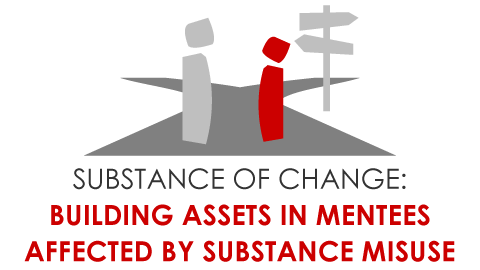FOCUS AREAS
Mentoring provides role models, social connectedness and a sense of belonging, and skills development for millions of youth and young adults. iRT studies mentoring as well as develops tools and services to support mentoring programs to maximize their impact on mentees.
Mentoring typically refers to an adult, older, or more experienced peer (the mentor) who is engaged in a non-professional helping relationship with a young person or peer (the mentee). The goals of this relationship can include primarily friendship, or helping the mentee explore his or her interests, or more specific goals, like learning a new skill.
Across the U.S., millions of youth are involved in mentoring relationships and there are thousands of formal and informal mentoring programs. These programs are operated by community-based organizations, schools, and faith-based organizations that support mentors in interacting with their mentee or mentees in a variety of settings. Some mentoring programs target any youth who could benefit from a caring, supportive relationship and others are more specific, such as targeting youth with a disability, youth in foster care, immigrant youth, children of incarcerated parents, adolescents involved in the juvenile justice system, and children in military families.
iRT has made important contributions to basic and applied research in the field of mentoring, as well as creating empirically validated and research-informed tools for use by practitioners.
Training
Research suggests that mentors, mentees, and their parent or guardian should all complete training before they meet for the first time to help prepare them for developing an effective mentoring relationship. Ongoing training should also be completed on relevant topics, as they arise during the life of the mentoring relationship.
iRT has contributed to research on training, as well as developed over 10 online and in-person training courses for mentors, mentees, and their parents. Courses have been custom designed for use by a range of different types of mentoring programs from in-person community-based mentoring, to school or site-based mentoring, to e-mentoring. The training topics cover the preparation for the mentoring relationship, ethics and safety issues in mentoring, strategically using mentoring to support educational outcomes in mentees, how substance use can impact the mentoring relationship, and training to teach high-school and college students’ relationship- and network building skills.
Dr. Katie Stump conducts research on the implementation of mentoring program best practices and the impact of practices on mentoring outcomes. She is the statistician across many mentoring evaluations, including a large, multisite randomized controlled trial project to evaluate mentoring program enhancements for programs serving children with an incarcerated parent. Dr. Stump has expertise in the areas of social development, peer relations, and quantitative methodology and analysis.
Dr. Rebecca Stelter has a personal interest in youth mentoring that began with her 10-year involvement as a Big Sister in the Big Brothers Big Sisters program. She is a co-author of the Elements of Effective Practice for Mentoring (EEPM), Third and Fourth Editions, and the recent Supplements to the EEPM. She conducts research on mentoring program best practices and training for mentors, mentees, parents, and mentoring program staff.
Dr. Janis Kupersmidt is a co-author of the Elements of Effective Practice for Mentoring (EEPM), Third and Fourth Editions, and the recent Supplements to the EEPM. She conducts research examining the prevalence of the practices described in the EEPM among mentoring programs and how implementation of the EEPM practices is associated with mentoring relationship and mentee outcomes. Her research also focuses on the importance of training in mentoring programs.
RELATED PROJECTS
RELATED PRODUCTS
RELATED PUBLICATIONS
RELATED PRESENTATIONS
Garringer, M., Kupersmidt, J. K., & Stelter, R. L. (2020, January). The devil is in the details- Going beyond global best practices to enhance mentoring program services. Paper presented at the 2020 National Mentoring Summit. Washington, D.C.
Spangnolo, S., & Stelter, R. L. (2020, January). Enhanced practices for mentoring youth impacted by incarceration. Paper presented at the 2020 National Mentoring Summit. Washington, D.C.
Stelter, R.L. (2019, September). STEM e-mentoring: Research-based recommendations for training and matching practices. Invited presentation at the Online Mentoring for STEM Talent Development International Expert Meeting. Regensburg, Germany.
Stelter. R. L., & Rucker, T., (2019, January). Enduring relationships and thriving form mentees: Results and recommendations from a recent long-term follow-up study of former mentees. Paper presented at the 2019 National Mentoring Summit. Washington, D.C.
Stelter, R. L., Stump, K. N., Kupersmidt, J. B., & Rhodes, J. B. (2018, April). Mentoring program enhancements supporting effective mentoring of children of incarcerated parents. Paper presented at the 2018 Society for Research on Adolescence. Minneapolis, Minnesota.
Stelter. R. L., Rucker, T., Burns, K. B., & Kupersmidt, J. B. (2018, January). Fostering big futures for high risk mentees. Paper presented at the 2018 National Mentoring Summit. Washington, D.C.
Stelter, R. L., Kupersmidt, J. B., & McNeil, S. (2016, October). What is a mentor? Building the foundation web-based training for mentees and their parents. Paper presented at the Society for Research in Child Development Special Topics Meeting: Technology and Media in Children’s Development. Irvine, CA.
Garringer, M., & Stelter, R. L., (2016, January). Making the best of “Best Practices”: Applying the Elements of Effective Practice for Mentoring to your program. Paper presented at the 2016 National Mentoring Summit: Connect Growth Opportunity. Washington DC.
Stelter, R. L., & Kupersmidt, J. B. (2015, January). The Young Men’s Initiative Mentoring programs: A model for public-private partnerships and improving mentoring program quality. Paper presented at the 2015 National Mentoring Summit: Expanding the Mentoring Effect, Washington DC.
Stelter, R.L., & Schwartz, S. (2015, January). Helping close the mentoring gap: Innovative approaches to training and engaging youth and their caregivers. Paper presented at the 2015 National Mentoring Summit: Expanding the Mentoring Effect, Washington DC.
Stump, K. N. (2014, January). Predicting premature closure in mentoring relationships. Paper presented at the annual meeting for the National Mentoring Summit, Washington, DC.
Kupersmidt, J. B. & Stelter, R. L. (2013, October). Best practices in mentor training and program assessment. Training presented at the University Massachusetts Boston Center for Evidence-based Mentoring Short Course on Mentoring Youth in the Foster Care System. Boston, MA.
Kupersmidt, J. B., Rhodes, J. E., & Stelter, R. L. (2013, January). Mentor training: Cutting edge training tools and resources and innovations in collaborative partnerships. Paper presented at the 2013 National Mentoring Summit: Washington DC.
Kupersmidt, J. B., Rhodes, J. E., & Stelter, R. L. (2012, January). MentoringCentral.net: Research-based mentor training and support. Paper presented at the 2012 National Mentoring Summit: Invest in the Future: Mentor a Child, Washington, DC.



